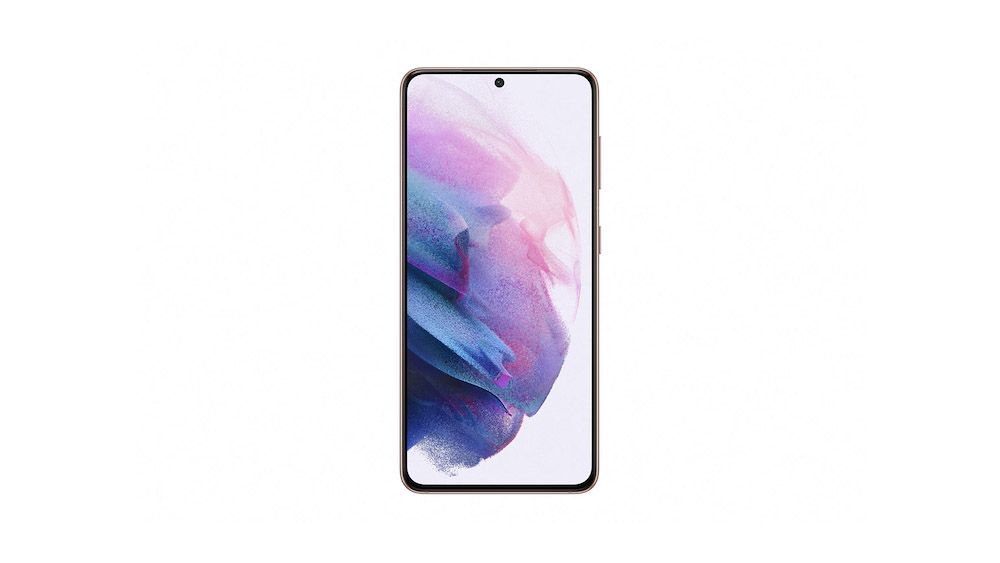What Hi-Fi? Verdict
The S21 gives here and takes there, but ultimately strengthens the Galaxy reputation
Pros
- +
Rich, smooth display
- +
Solid battery life
- +
Superb all-round camera
Cons
- -
No microSD slot, earbuds or charger
- -
Sony rival sounds better
Why you can trust What Hi-Fi?
With flagship smartphones from the likes of Samsung and Apple reliably refreshed every year, it’s perhaps unrealistic to expect every handset to make giant strides in terms of performance or specifications. So, it’s little surprise that the new Samsung Galaxy S21 is more of a refinement of its predecessor than a revamp.
Last year's Galaxy S20 line-up marked a thorough overhaul, bringing in 5G support and 120Hz refresh rate displays for the first time, plus significant camera upgrades. But for the S21 range, the gains are more marginal – the camera software has been enhanced, the design is arguably better and it packs the company’s most advanced processor yet (the 5nm Exynos 2100).
Of the three-strong, 5G-supporting Galaxy S21 range, you’ll want to consider the two more premium models, the S21+ S21 Ultra, if you’re after a large screen, a top-spec camera (offered by the S21 Ultra), or are particularly excited by the prospect of using your phone to unlock your car (both support the UWB tech that makes this possible).
But for those who are happy with a 6.2in screen and relatively affordable price tag, the ‘standard’ S21 offers the bulk of the S21 features in the smallest, most affordable package of the three.
Pricing
For in-range comparison, the S21+ costs £949 and £999 for the same RAM and storage sizes (for the US or Australia, add $200 or AU$200 onto the cost of each S21 model). The S21 Ultra starts at £1149 ($1200, AU$1849) for the 128GB and goes up to £1329 ($1380, AU$2149) for the 512GB variant.
The Galaxy S21 (alongside the S21+ and S21 Ultra) is available from 29th January – its Galaxy S20 predecessor began shipping at the beginning of March 2020. Those who pre-order the handset before this date will get a free pair of Galaxy Buds Live true wireless earbuds, plus a free Galaxy SmartTag.
The Galaxy S21 has 8GB RAM and is available in 128GB and 256GB storage options, priced £769 ($799, AU$1249) and £819 ($850, AU$1349) respectively. That’s considerably less than the price of the 5G, 12GB RAM version of the S20 at launch last year, and slightly less than the 4G, 8GB version of the S20.
That considered, Samsung has priced the S21 pretty nicely, however, the microSD card slot for expanding the devices’ built-in storage is no more for the S21 and S21+.
Screen
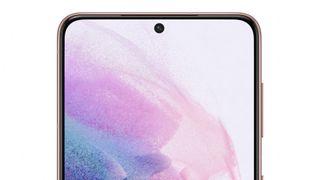
In terms of its screen, the series’ biggest evolution is that the S21 Ultra now offers the 120Hz refresh rate at its maximum resolution (3200x1440). That rate alongside the Galaxy S21’s lower resolution (2400x1080) still works wonders for responsiveness and smooth motion performance.
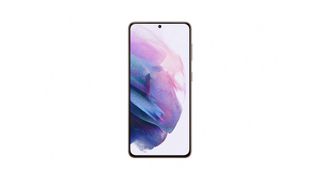
Screen 6.2in
Resolution 2400 x 1080
Cameras x3 (12MP, 12MP, 64MP)
Finishes x4
Dimensions (hwd) 7.1 x 15.2 x .8cm
Weight 171g
The S21 Ultra is the only handset in the series to get the S-Pen, as it debuts in the Galaxy S series. However, don’t rule out the accessory coming to smaller phones in the future, as Samsung president TM Roh hinted that the company plans to expand the S Pen “across additional device categories”.
Samsung has stuck with the screen sizes of its S20 line-up, meaning the S21, like its predecessor, has a 6.2in display. The Dynamic AMOLED 2X Infinity-O screen supports HDR10+ and has a Full HD resolution of 2400x1080, rather than 3040x1440. This results in a slightly lower pixel density, but that shouldn’t put you off.
In our review of the S20, we called its screen ‘richly colourful and impressively detailed’, and thankfully it’s more of the same this time around. In fact, the S21’s display is very similar, in character if not in resolution.
We watch the Kilauea volcano erupt in the BBC’s Perfect Planet documentary and find it a great advert for the S21’s punchy colour palette, the yellow and orange hues of the lava eye-dazzlingly bright and saturated. The picture is crisply sharp, and that’s backed up with decent levels of detail in rubble, sea and smoke.
However, in comparison, both Sony’s similarly priced Xperia 5 II and more expensive flagship Xperia 1 II boast better all-round screens. We prefer the Samsung’s enthusiastic colour palette – we play the second episode of WandaVision on Disney+ and as colour floods the house and washes over the screen, reds, greens, yellows and oranges look more solid – but the Sonys are sharper and deliver better overall contrast, their OLED displays doing a particularly great job of producing deep blacks that don’t sacrifice dark detail.
Sound
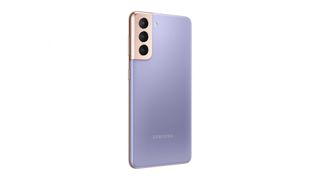
Similarly, the two Sonys better the Samsung for sound quality. We plug in our wired Sennheiser Momentum earbuds via the Sony’s 3.5mm headphone jack (the Samsung’s USB-C output also requires a dongle adapter) and play coney island by Taylor Swift and The National. The Sonys serve up more space around the acoustic plucks and drum and greater vocal expression. Their dynamic and rhythmic superiority mean they also keep a better musical handle on the composition underneath the vocals.
While the S21 isn’t quite as sophisticated a sound, it’s perfectly listenable. There’s clarity and detail throughout the presentation, but particularly in its open midrange, and the delivery isn’t bereft of punch and solidity. The Samsung performs well for a smartphone, the Sonys simply perform more like a dedicated music player. Note that Samsung has removed the bundled earbuds (as well as the charger plug) from the box, so you’ll need a pair of your own.
Features
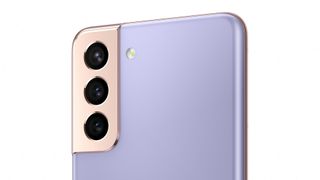
The Samsung manages to outperform the Sonys in terms of its camera performance, as the Galaxy S21 proves one of the best camera phones around. Like the S21+, the S21 pairs a triple-lens rear camera comprising ultra-wide 12MP (capable of a 120-degree field of view), wide-angle 12MP and 64MP telephoto lenses with a 10MP front snapper – but Samsung has taken further strides in the AI processing department to get even more out of it.
The S21‘s luscious colour capture makes the Sonys’ seem washed out in comparison, while the Samsung takes the spoils when it comes to sharpness and clarity too. Compared with the S20, shots are a little brighter – sometimes at the expense of some shadow detail and depth – and slightly sharper. It’s a close call though, which shows how well Samsung did with the S20’s shooter.
Thanks to an improved Night Sight mode, our attempts at night-time photography with the S21 surface more brightness and highlights. The S20 might grasp some of the night hues more accurately, but its successor digs up more detail overall.
Samsung has also tweaked its Portrait Mode, which now lets owners adjust the lighting and add background effects to their selfies, while Single Take, which works to create a portfolio of all the ‘best moments’ you capture in one shot, now includes a slow-mo capture and Highlight Video reel. The 30x Space Zoom now has a ‘lock’ to help steady photo capture at its maximum reach, too.
For video recording, not only is there 8K video recording at 24fps (or 4K shooting at 60fps), an all-new Director’s View lets you see and switch between all four lenses during recording – handy for making short movie clips. Samsung’s new Galaxy Buds Pro wireless earbuds can also enhance the movie-making experience by allowing you to capture both ambient sounds (through the S21’s mic) and your voice (through the Buds Pro’s mic) at the same time.
The rear camera is the most noteworthy design development of the S21, with its all-new contoured bump in the top left-hand corner blending into the metal frame. Our Phantom Violet sample (a new colourway for Samsung) looks sleek, with the rose gold bump and frame an attractive match for the purple matte-finished rear panel. It looks just as good with the alternative Phantom Grey, Phantom Pink and Phantom White colour options.
The plastic casing – one of the sacrifices for the lower pricing – doesn’t make the device feel as premium as the glass-backed S20, but it is lightweight (171g) and easy to hold in the hand. And its IP68 rating, which is standard for Galaxy S devices in recent years, means it should be well protected from water, dirt and dust. Officially, they should be resistant to submersion up to a depth of 1.5m underwater for up to 30 minutes.
Verdict
While not offering any notable AV upgrades over the S20, the Samsung Galaxy S21 shuffles the S series along nicely with camera enhancements, aesthetic improvements and some modest functionality boosts. It sacrifices some screen spec, premium build and accessories in order to hit a lower price tag, but there is still an excellent balance between performance and value.
The S21 is far from an overhaul of its predecessor, and certainly not a reason for S20 owners to upgrade, but Android fans with older handsets looking for an all-new shiny device can’t go far wrong here – especially if camera performance and value are high on their priority list. Either of the Sony Xperias are better bets for those who place greater importance on music listening, so that’s one area we would hope Samsung advances for the next generation of Galaxy S phone. For now, though, the line’s reputation as one of the market’s best all-rounders remains intact.
SCORES
- Screen 5
- Sound 4
- Features 5
MORE:
Read our guide to the best smartphones
Read our Sony Xperia 1 II review
Read our Sony Xperia 5 II review
Read our Samsung Galaxy S20 review
What Hi-Fi?, founded in 1976, is the world's leading independent guide to buying and owning hi-fi and home entertainment products. Our comprehensive tests help you buy the very best for your money, with our advice sections giving you step-by-step information on how to get even more from your music and movies. Everything is tested by our dedicated team of in-house reviewers in our custom-built test rooms in London, Reading and Bath. Our coveted five-star rating and Awards are recognised all over the world as the ultimate seal of approval, so you can buy with absolute confidence.
